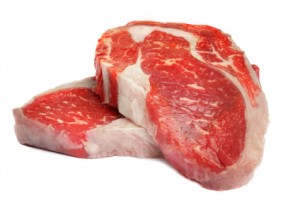Are Whole Grains Heart Healthy?
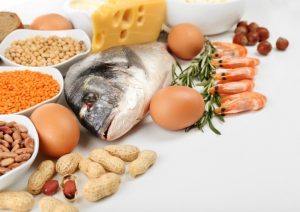 The diet wars continue. Dr. Strangelove and his colleagues are still trying to convince you that you can eat all the red meat you want. It is those deadly whole grains, beans, and fruits you need to avoid.
The diet wars continue. Dr. Strangelove and his colleagues are still trying to convince you that you can eat all the red meat you want. It is those deadly whole grains, beans, and fruits you need to avoid.
However, as the benefits of primarily plant-based diets continue to accumulate, it is becoming harder for them to maintain these preposterous claims.
For example, several recent studies have shown that replacing animal protein with plant protein in your diet results in better health.
- The Iowa Women’s Health Study found that plant protein substitution for animal protein is associated with reduced risk of dying from heart disease.
- The Nurse’s Health Study and Health Professionals Follow-up Study found that greater plant protein intake was associated with reduced risk of dying from heart disease and reduced risk of dying from all causes.
- The Japan Public Health Center-Based Prospective Cohort Study found a reduced risk of dying from heart disease, cancer, and all causes with substitution of plant protein for red meat protein.
These were all very large studies in which populations were followed for long periods of time. You might be thinking that with such overwhelming evidence no further studies are needed.
However, these studies did not examine which plant protein sources were most beneficial and which animal protein sources were most detrimental. The study (J. Huang et al, JAMA Internal Medicine, published online July 13, 2020) I describe in today’s “Health Tips From The Professor” was designed to answer that question.
How Was The Study Done?
 416,104 participants from the NIH-AARP Diet and Health Study were enrolled in this study in 1995 and 1996 and were followed for 16 years. At the time of enrollment, the participants filled out a comprehensive Diet History Questionnaire. The participants also completed questionnaires about their health, lifestyle, and socio-economic status.
416,104 participants from the NIH-AARP Diet and Health Study were enrolled in this study in 1995 and 1996 and were followed for 16 years. At the time of enrollment, the participants filled out a comprehensive Diet History Questionnaire. The participants also completed questionnaires about their health, lifestyle, and socio-economic status.
Deaths were obtained from the Social Security Death Master File. Causes of death were obtained from the National Death Index Plus.
The basic characteristics of the study population were:
- Gender: 57% men, 43% women.
- Racial identification: 90% non-Hispanic white.
- Average age 61 (range 50-71).
- Average BMI = 27 (in the overweight range).
- Participants were excluded from the study if they had pre-existing cancer, heart disease, stroke, or end-stage kidney disease.
In terms of protein intake:
- Average protein intake was 15.3% of calories.
- Plant protein contributed 40% (range 27% – 57%) to the total protein intake.
- Animal protein contributed 60% (range = 43% to 63%) of the total protein intake.
The major sources of animal protein in the diet were:
- Dairy products = 31.6%
- White meat (poultry, fish, and processed white meat) = 31.3%
- Red meat (both fresh and processed) = 30.6%
- Eggs = 4.0%
The major sources of plant protein in the diet were:
- Grains (bread, cereal, and pasta) = 45.8%
- Beans and legumes = 8.0%
- Nuts and seeds = 4.5%
- Other plant protein (including plant protein from supplements) = 41.7%
All these protein intake figures are normal for the American diet.
I should note that beans, nuts, and seeds are among the best sources of plant protein. However, they are only a minor part of the typical American diet, so they contribute relatively little to our plant protein intake.
Does Eating Plant Protein Help You Live Longer?
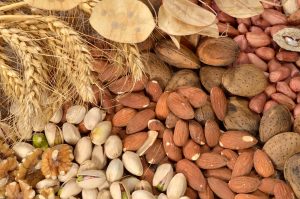 In terms of overall protein intake, this study mirrored previous studies.
In terms of overall protein intake, this study mirrored previous studies.
- There was an inverse association between plant protein intake and premature death from heart disease, stroke, and all causes. Put another way, the more plant protein people in this study ate, the lower was their risk of premature death.
To quantify the effect, the investigators asked what happened when 3% of calories came from plant protein instead of animal protein. I recognize, however, that 3% of calories is a rather abstract concept, so let me break it down for you so you can apply it to your lives.
- For participants in this study, protein was 15% of their total calories. That means when the investigators were talking about shifting 3% of total calories from animal protein to plant protein, they were talking about 20% of the protein in the diet coming from plant protein rather animal protein.
- Based on the average caloric intake of participants in this study, that corresponds to 15 grams of protein for men and 12 grams of protein for women.
With that in mind, let’s look at the results:
- Changing just 3% of calories from animal protein to plant protein:
- Lowered the risk of premature death from all causes by 10% for both men and women.
- Lowered the risk of premature death from cardiovascular disease by 11% for men and 12% for women.
- Lowered the risk of premature death from stroke by 22% for men and 19% for women.
These findings are consistent with previous studies. By now, it should be apparent that primarily plant-based diets are best for your overall health. Primarily plant-based diets also appear to reduce your risk of dying prematurely from heart disease and from all other diseases combined.
The authors concluded: “This large cohort investigation showed small but significant associations between higher intake of plant protein and lower overall and cardiovascular mortality…Findings from this and previous studies provide evidence that dietary modifications in choice of protein sources may promote health and longevity.”
However, this part of the study merely confirms what other studies have shown. What makes this study unique is that it identifies which animal proteins are worst for us and which plant proteins are best for us.
Which Animal Proteins Are Least Heart Healthy?
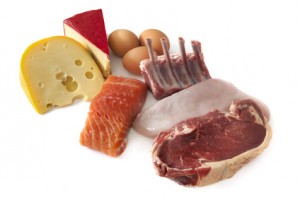 Let’s start with the animal proteins (Note: To simplify a complex set of data, I am going to average the results for men and women).
Let’s start with the animal proteins (Note: To simplify a complex set of data, I am going to average the results for men and women).
- Changing 3% of calories from egg protein to plant protein:
-
- Lowered the risk of premature death from all causes by 23%.
-
- Lowered the risk of premature death from cardiovascular disease by 27%.
-
- To put this into perspective, 3% of calories from egg protein corresponds to around 2.5 eggs/day. So, talking about replacing 3% of calories of egg protein creates a false narrative. The average egg consumption in this study was 0.5 eggs/day and very few participants consumed even 2 eggs every day. If we make a more reasonable comparison, replacing one egg/day with an equivalent amount of plant protein:
-
-
- Lowers the risk of premature death from all causes by 9%.
-
-
-
- Lowers the risk of premature death from cardiovascular disease by 11%.
-
- Changing 3% of calories from red meat protein to plant protein:
-
- Lowered the risk of premature death from all causes by 14%.
-
- Lowered the risk of premature death from cardiovascular disease by 12%.
-
- Lowered the risk of premature death from stroke by 21%.
-
- To put this into perspective, 3% of calories from red meat protein corresponds to around 2 ounces/day.
- Changing 3% of calories from dairy protein to plant protein:
-
- Lowered the risk of premature death from all causes by 8%.
-
- Lowered the risk of premature death from cardiovascular disease by 11%.
-
- Lowered the risk of premature death from stroke by 21%.
-
- To put this into perspective, 3% of calories from dairy protein corresponds to around 1.7 8-ounce glasses of milk, 2 ounces of cheese, or 1 cup of yogurt (most yogurt “cups” sold commercially are less than an 8-ounce cup).
- Changing 3% of calories from white meat protein to plant protein had no effect on premature death from any disease in this study. I will discuss the reasons for that below.
Are Whole Grains Heart Healthy?
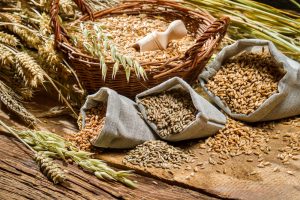 Now, let’s look at the flip side. What happens when you replace 3% of calories from red meat protein with various kinds of plant protein?
Now, let’s look at the flip side. What happens when you replace 3% of calories from red meat protein with various kinds of plant protein?
- Changing 3% of calories from red meat protein to plant protein from whole grains:
-
- Lowered the risk of premature death from all causes by 28%.
-
- Lowered the risk of premature death from cardiovascular disease by 32%.
-
- Lowered the risk of premature death from stroke by 32%.
-
- To put this into perspective, 3% of calories from whole grain protein corresponds to around 2.5 slices of whole grain bread, 2 cups of oatmeal, or 2.5 cups of brown rice or whole grain pasta – or any combination of them during the day.
- The results were similar for replacing egg protein with whole grain protein.
- Changing 3% of calories from red meat protein or egg protein to other types of plant protein had no effect on premature death from any disease. The reasons for that will be discussed below.
The authors concluded “…this investigation showed prominent inverse associations between overall and cardiovascular mortality and the replacement of egg protein and red meat protein with plant protein, particularly for plant protein derived from bread, cereal, and pasta…”
Why Do Animal Proteins Increase Your Risk Of Premature Death?
Let me take a deep dive into the data. If you like, you can skip to “What Does This Study Mean For You?”
To help you gain a better understanding of these results, I will answer two questions for you:
- Mechanism: What is/are the metabolic explanation(s) for these results?
- Perspective: How can you apply this information to your own life?
Reminder: This section is for those of you who want the details. I will give the Cliff Notes summary in the section “What Does This Study Mean For You”.
Mechanism:
- The bad effect of eggs on cardiovascular mortality and all-cause mortality is thought to be almost exclusively due to their high cholesterol content.
- On the flip side, eggs are an excellent source of low-fat animal protein and provide nutrients like choline and carotenoids that are often insufficient in the American diet.
Perspective:
- Our bodies have a beautifully designed system for regulating blood cholesterol levels. This means under ideal conditions dietary cholesterol has very little effect on blood cholesterol levels. However, as I have pointed out in a previous issue of “Health Tips From the Professor”, conditions are often far from ideal.
- Diet context matters. Obesity, saturated fat, and sugar all interfere with our ability to regulate blood cholesterol levels. People consuming the typical American diet, like the ones in this study, have more difficulty regulating their blood cholesterol levels and are more likely to be adversely affected by dietary cholesterol from eggs and other high-cholesterol foods.
-
- Previous studies suggest that adding eggs to the typical American diet may increase risk of cardiovascular disease and premature death.
-
- In contrast, adding eggs to a primarily plant-based diet, such as found in China and Japan, appears to decrease risk of heart disease and premature death.
Mechanisms: The mechanism(s) associated with the bad effects of red meat are less clear. Here are the potential mechanisms discussed by the authors of this study.
- Red meat is high in cholesterol. While many experts have downplayed the importance of dietary cholesterol in recent years, it still may be of concern in the context of the typical American diet because of our body’s inability to regulate cholesterol metabolism normally.
- Red meat is high in saturated fat. While some experts have downplayed the importance of reducing saturated fat intake, I pointed out in a previous issue of “Health Tips From the Professor” that it depends on what the saturated fat is replaced with.
-
- When saturated fats are replaced with sugar and refined carbohydrates in the typical American diet, reducing saturated fat is of no benefit.
-
- When saturated fats are replaced with polyunsaturated fats in the context of a primarily plant-based diet, such as the Mediterranean diet, reducing saturated fats leads to a substantial reduction in the risk of heart disease and premature death.
- Red meat also contains heme iron which is associated with 57% increased risk of cardiovascular disease.
- Diets high in red meat result in populations of gut bacteria that are associated with increased risk of cardiovascular disease. This is most likely because red meat is displacing plant foods that support the growth of healthy bacteria.
- As discussed in a recent issue of “Health Tips From the Professor”, the gut bacteria associated with red meat consumption convert the L-carnitine in red meat to a metabolite called trimethylamine N-oxide (TMAO) which appears to significantly increase the risk of cardiovascular disease.
- Finally, a recent study suggests that foods high in sulfur-containing amino acids significantly increase risk of cardiovascular disease. However, this mechanism is not specific for red meat. White meat, beans, and legumes are also high in sulfur-containing amino acids.
Perspective:
- While the exact mechanism(s) is/are uncertain, there is substantial evidence from multiple studies that red meat consumption increases the risk of premature death from cardiovascular disease and from all causes.
- Grass fed beef is not a “get out of jail free card”. Grass fed beef is modestly lower in cholesterol and saturated fat. However, those are only two of six potential mechanisms for the link between red meat consumption and cardiovascular disease.
- However, those of you who, like me, enjoy red meat should not consider this to be an absolute “red meat should never touch your lips” edict. As I have discussed in a previous issue of “Health Tips From the Professor”, the health effects of red meat are a matter of quantity and diet context.
-
- If you are thinking in terms of a juicy 8-ounce steak with a baked potato and sour cream, red meat is probably not a healthy choice.
-
- However, if you are thinking of 2-3 ounces of lean steak in a vegetable stir fry or a green salad, red meat may be a healthier choice.
 Dairy: I have reported on the health risks and benefits of dairy foods in a previous issue of “Health Tips From the Professor”, so I will just give you a brief summary here.
Dairy: I have reported on the health risks and benefits of dairy foods in a previous issue of “Health Tips From the Professor”, so I will just give you a brief summary here.
Perspective:
- Eating dairy foods, even high-fat dairy foods, has relatively little effect on cardiovascular disease risk in the context of the typical high-fat, high-sugar American diet.
- Eating dairy foods, even high-fat dairy foods, in the context of a healthy plant-based diet appears to lower cardiovascular disease risk.
- As this study suggests, moving towards a more plant-based diet by substituting some plant protein for dairy protein in the diet will also decrease your risk of cardiovascular disease
White Meat: This and previous studies suggest that white meat is less likely than red meat to increase the risk of cardiovascular disease and premature death. I have discussed the differences between red and white meat in a previous issue of “Health Tips From the Professor”. However, I can summarize the differences best here by going back to the mechanisms associated with the link between red meat and cardiovascular diseases and highlight those that do not apply to white meat.
Mechanisms:
- Saturated fat. Many fish are much lower in saturated fat and are excellent sources of heart-healthy omega-3 fats. Chicken and turkey breast with the skin removed are also much lower in saturated fat than red meat.
- Heme iron. Chicken breast is lower in heme iron than red meats.
- TMAO. White meats contain 10-50 times less L-carnitine than red meats. Since L-carnitine is the precursor of TMAO, they are much less likely to cause TMAO production.
Why Do Plant Proteins Decrease Your Risk Of Premature Death?
 Whole Grains: Whole grains have been much maligned in recent years. They have been lumped in with sugar and refined grains and have been added to everyone’s “naughty list”.
Whole Grains: Whole grains have been much maligned in recent years. They have been lumped in with sugar and refined grains and have been added to everyone’s “naughty list”.
- If you are following a low-carb diet, you are told to avoid all grains.
- If you are following a Paleo diet, you are told our paleo ancestors ate no grains.
- If you are trying to avoid lectins…you get the point.
That’s unfortunate, because whole grains are very healthy. In a recent issue of “Health Tips From the Professor” I shared a study showing that whole grain consumption reduced the risk of premature death from heart disease, cancer, and all causes. The current study shows essentially the same thing.
The only question is why whole grains are uniquely effective at decreasing premature death from cardiovascular disease and all causes in this study. Why aren’t all plant proteins equally effective? I will share both a suggested mechanism and perspective.
Mechanism:
- In a recent issue of “Health Tips From The Professor” I reported a study showing that grains and a few other foods contain a unique type of fiber called resistant starch that suppress growth of the gut bacteria which convert L-carnitine to TMAO. This may be why whole grains are uniquely effective at reducing the risk of cardiovascular disease and premature death.
- Some refined grains are also good sources of resistant starch. However, I don’t recommend them because they lack the antioxidants, vitamins, phytonutrients, and insoluble fiber found in whole grains.
Perspective:
The fact no other plant protein source significantly reduced heart disease risk in this study is most likely an artifact of the study.
- The study asked what happens when you change 15 grams of the protein in your diet from red meat protein to different kinds of plant protein. That question was easy to answer for grains because they are a major source of protein in the American diet. However, Americans don’t get enough protein from other high protein plant foods like beans and legumes or nuts and seeds to provide a statistically valid answer to that question.
- However, all plant foods have their own health benefits. They are excellent sources of antioxidants and phytonutrients that provide heart health benefits.
- In addition, each plant food provides a different blend of fibers and supports different populations of gut bacteria with different health benefits. For example, fiber from fruits and vegetables is associated with a lower risk of cancer.
What Does This Study Mean For You?
 A recent study has shown that changing as little as 20% of the protein in our diet from animal protein to plant protein significantly reduces our risk of premature death from cardiovascular disease, stroke, and from all causes.
A recent study has shown that changing as little as 20% of the protein in our diet from animal protein to plant protein significantly reduces our risk of premature death from cardiovascular disease, stroke, and from all causes.
The effect of replacing 2 ounces of red meat, 1 egg, or 2 servings of dairy with an equivalent amount of plant protein was equally beneficial.
Previous studies show that diet context is important. A small amounts of animal protein in the context of a whole food, primarily plant-based diet is much less likely to cause harm and may provide benefit. For example:
- Eggs are high in cholesterol but are also excellent sources of low-fat protein and nutrients that may be missing in a plant-based diet.
-
- Previous studies suggest that adding eggs to the typical American diet may increase risk of cardiovascular disease and premature death.
-
- In contrast, adding eggs to a primarily plant-based diet, such as found in China and Japan, appears to decrease risk of cardiovascular disease and premature death.
- Dairy foods are high in saturated fat but are excellent sources of calcium, vitamin D, and other nutrients that may be missing in a plant-based diet.
-
- Eating dairy foods, even high-fat dairy foods, has relatively little effect on cardiovascular disease risk in the context of the typical high-fat, high-sugar American diet.
-
- Eating dairy foods, even high-fat dairy foods, in the context of a healthy plant-based diet appears to lower cardiovascular disease risk.
- Red meat has multiple suggested mechanisms for it increasing the risk of death from cardiovascular disease. However, diet context still matters.
-
- If you are thinking in terms of a juicy 8-ounce steak with a baked potato and sour cream, red meat is probably not a healthy choice.
-
- However, if you are thinking of 2-3 ounces of lean steak in a vegetable stir fry or a green salad, red meat may be a healthier choice.
-
- Grass fed beef should not be considered a “get out of jail free card”. Grass fed beef is modestly lower in cholesterol and saturated fat. However, those are only two of six potential mechanisms for the link between red meat consumption and cardiovascular disease.
- White meat does not appear to affect your risk of developing cardiovascular disease.
- Whole grains significantly decreased the risk of premature death from cardiovascular disease and death from all causes. This may be because whole grains contain a unique type of fiber called resistant starch that suppresses the growth of the gut bacteria which convert L-carnitine to a heart-damaging compound called TMAO.
-
- Notice that I specified “whole grain”. While some refined grains are also a good source of resistant starch, they lack the other heart healthy nutrients and phytonutrients found in whole grains.
-
-
- Wonder Bread, Frosted Flakes, Honey Bunches of Oats, and white-flour pasta are not on my approved list. I agree with low-carb enthusiasts about eliminating them from our diets.
-
-
-
- You should also be aware that “whole grain” on the label means nothing. You want to choose foods that say “100% whole grain”.
-
-
- Finally, this study only focused on plant protein sources. It is important to remember that other plant foods are an excellent source of antioxidants, phytonutrients, and fiber. Each plant food provides unique heart health benefits.
The Bottom Line
A recent study has shown that changing as little as 20% of the protein in our diet from animal protein to plant protein significantly reduces our risk of premature death from cardiovascular disease, stroke, and from all causes.
The effect of replacing 2 ounces of red meat, 1 egg, or 2 servings of dairy with an equivalent amount of plant protein was equally beneficial. White meat did not affect the risk of cardiovascular disease or premature death.
- Grass fed beef should not be considered a “get out of jail free card”. Grass fed beef is modestly lower in cholesterol and saturated fat. However, those are only two of six potential mechanisms for the link between red meat consumption and cardiovascular disease.
- Diet context is important. Small amounts of animal protein in the context of a whole food, primarily plant-based diet appear to be much healthier for us than large amounts of animal protein in the context of the high-fat, high-sugar American diet.
On the flip side of the equation, whole grains significantly decreased the risk of premature death from cardiovascular disease and death from all causes. This has also been seen in other recent studies.
- Notice that I specified “whole grain”. Wonder Bread, Frosted Flakes, Honey Bunches of Oats, and white-flour pasta are not on the list.
- You should also be aware that “whole grain” on the label means nothing. You want to choose foods that say “100% whole grain”.
- Finally, this study only focused on plant protein sources. It is important to remember that other plant foods are an excellent source of antioxidants, phytonutrients, and fiber. Each plant food provides unique heart health benefits.
For more details, read the article above, especially the “What Does This Study Mean For You?” section.
These statements have not been evaluated by the Food and Drug Administration. This information is not intended to diagnose, treat, cure, or prevent any disease.


